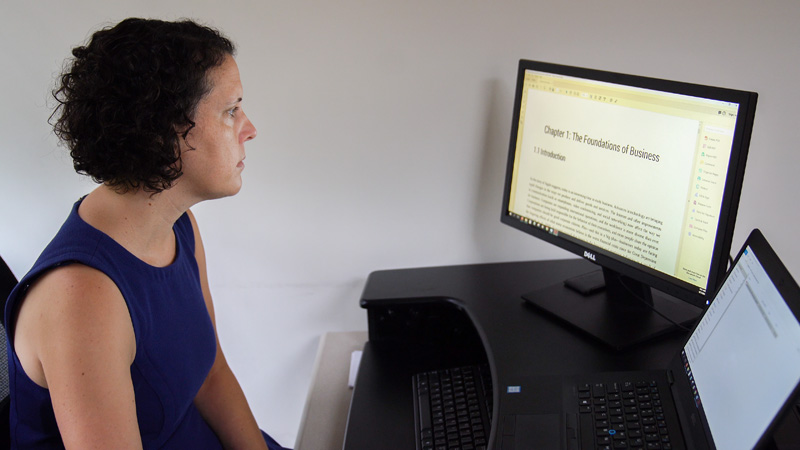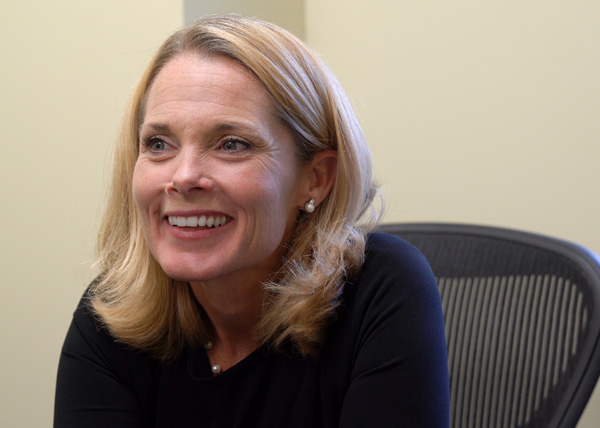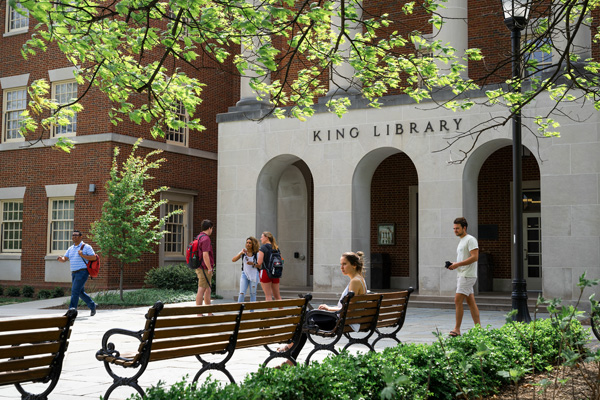BUS 101 adopts free open educational resource in place of traditional textbook
Written by Vince Frieden, Coordinator of Strategic Communications, University Libraries
Video by Nick Kneer, Communications Specialist, University Libraries
Carla Myers still remembers that sinking feeling she experienced each fall as an undergraduate leaving her campus bookstore.
“I put myself through college, and I remember working all these jobs during the summer to have enough money,” Myers recalled. “I’d pay my tuition bill with a little money left over, and then I’d leave the bookstore in tears because I didn’t have enough to cover all my textbooks. It was frustrating and disappointing for someone who really wanted to be a good student.”
Now the coordinator of scholarly communications within the Miami University Libraries, Myers finds herself part of a collaborative effort - involving faculty, the Provost’s Office and counterparts in the University Libraries - to minimize the financial impact of textbooks and course materials on Miami’s students.
These efforts come at a time when families are struggling with the rising costs of higher education and as rampant inflation in the textbook industry is outpacing that of even medical care.
“In order to offer an extraordinary educational experience, we need a diverse array of learners who come from all backgrounds, including varying family incomes,” Associate Provost Carolyn Haynes noted. “To gain that diversity, we are committed to doing everything we can to reduce the overall cost of a college education. That includes reducing textbook costs, which have risen by 1,000 percent over the past four decades.”
Exploring affordable alternatives
Central to this focus is the promotion and adoption of Open Educational Resources (OERs), educational materials that are in the public domain or introduced with an open license. The nature of OERs means that anyone can legally copy, use, adapt and re-share them at no cost.
To date, Miami’s textbook affordability efforts have included the formation of a faculty Open Educational Resource/Affordability Committee and the introduction of a series of grant-eligible OER faculty programs to inform, encourage and support faculty in exploring, implementing and even creating OER options.
Those efforts registered a signature achievement at the start of the fall semester when the BUS 101 Foundations of Business course - a First-Year Integrated Core course enrolling an estimated 600 students per semester - adopted an OER in place of a traditional textbook. Cindy Oakenfull, assistant lecturer within the Farmer School of Business and the faculty-lead for BUS 101, collaborated with Myers and business librarian Susan Hurst during the summer to identify and customize the OER.

“In selecting the textbook for Business 101 and realizing that the cost of those materials was going to affect 1,000-plus students, we were really challenged to think about how we could reduce that financial impact,” Oakenfull said. “The OER options available were equal if not superior to the ones I reviewed from various publishers. When you combine the quality of the material with the ability to customize it specifically for our needs and the cost savings, it was really an easy choice.”
A customized version of the OER, featuring only the chapters needed for the course, is available for students to download via the university’s Canvas platform. Students can read the text online, download and print it, or even have a version professionally printed at a fraction of the cost of a traditional textbook.
Building momentum
The concept is catching on. According to Haynes, faculty are utilizing OERs and related alternatives to eliminate or dramatically reduce course material costs in more than 20 courses. OERs are not an option for every course, and the Libraries also support alternatives:
-
Textbooks on Reserve: Textbooks for many of Miami’s most enrolled classes are available for checkout at University Libraries’ locations. This program is possible through a combination of faculty placing extra copies of their textbooks on reserve and #MoveInMiami donor support.
-
Course Pack Consultation Service: Supports faculty in replacing printed readings-based course packs with materials that are already freely accessible through Libraries’ resources.
-
Alternate Textbook Program: Assists faculty in developing a reading list of resources freely available through the University Libraries’ purchased electronic collections, legal online resources and selections made in compliance with U.S. copyright law.
Regardless of the means, the outcome of an affordable, quality education matters to Miami students.
This past summer, the Associated Student Government co-presented the inaugural Affordable Education Leader Award to Andrew Paluch, assistant professor of chemical, paper and biomedical engineering, who created his own free, open resource textbook for a computational methods course. According to Paluch, the goal is about more than dollars and cents.
“My driving force in coming to Miami was the dedication to undergraduate education,” Paluch said. “My perspective is not necessarily that this is me saving students money. This is a resource or tool we can develop to improve the education of our students and ensure they have access to the resources they need … I see Miami as a place where we can excel in this field and be national leaders. “
To learn more about textbook and course material affordability options, contact Carla Myers, coordinator of scholarly communications, at myersc2@MiamiOH.edu or 513-529-3935.